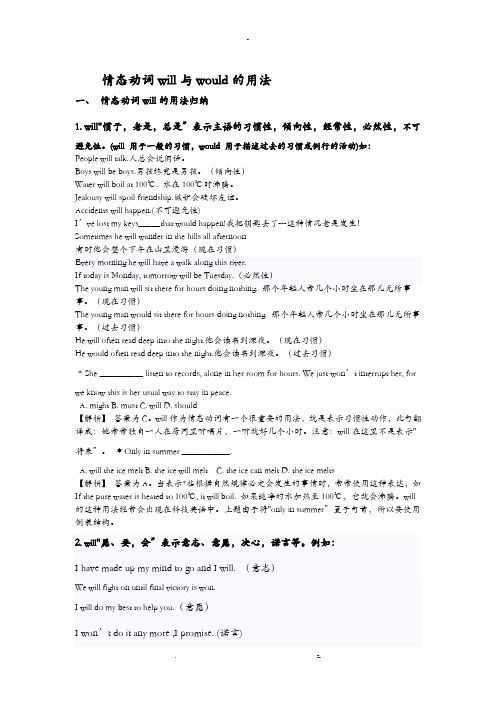复习专题情态动词完整归纳
情态动词(20张PPT)初中英语专项复习课件

(1)只作情态动词:must;can/could;may/might;ought to
(2)既可作情态动词又可作实义动词:need,dare
((34))既 具可 有作 情情 态态 动动词词某又些可特作征稿稿定助:定hPa动PPvTP,e词T/海h:量asd素ha材tlo持l;/s续hha更odublde;twteirll/would
【知识拓展】
1. must的一般疑问句,肯定回答为Yes, ...must.;否定回答为No, ...needn’t./No, ...don’t have
to.—Must I clean the classroom now? 我必须现在打扫教室吗?
—Yes, you must. 是的,你必须。/No, you don’t have to. /No, you needn’t. 不,你不必。
He promised he would never smoke again. 他承诺他再也不吸烟了。
Their English teacher would tell them stories in
表示过去反复发生的动 English after class.
作或某种倾向
他们的英语老师总是在课后用英语给他们讲故事
新,上千款模板选择总有一
款适合你
知识点二:情态动词的特点
情态动词的特点: (1)情态动词无人称和数的变化(have to除外); (2)情态动词后接动词原形; (3)情态动词的否定式是在其后加not; have to除外 (4)具有助动词的作用,可用来构成否定句、疑问句及用于简明答语; (5)个别情态动词有现在式和稿过定去PP式T两种形式,过去式用来表达更加客气、委 婉的语气,时态性不强,可稿用定于PPT过,海去量、素材现持在续更或将来。
成人情态动词总复习

成人情态动词总复习本文档旨在提供成人情态动词的总复,帮助读者对这些动词有更全面的了解和掌握。
下面是一些常见的情态动词及其用法:1. Can- 表示能力或掌握某种技能,也可用于征询许可。
例如:- I can swim.(我会游泳。
)- Can I use your phone?(我能用你的手机吗?)2. Could- 过去式形式,表示过去的能力、掌握的技能或征询过去的许可。
例如:- I could swim when I was younger.(我小时候会游泳。
)- Could I borrow your pen yesterday?(昨天我能借你的钢笔吗?)3. May- 表示可能性、征询许可或提出请求。
例如:- It may rain tomorrow.(明天可能会下雨。
)- May I have a glass of water?(我可以喝杯水吗?)4. Might- 表示可能性较小,委婉地提出请求或建议。
例如:- It might rain later.(可能会下雨。
)- Might I suggest an alternative solution?(我可以建议一个替代方案吗?)5. Must- 表示义务、必要性或推测的确定性。
例如:- You must finish your homework before going out.(你必须先完成作业再外出。
)- He must be tired after working all day.(他一整天工作下来肯定很累。
)6. Should- 表示建议、期望或是对某事的合理推断。
例如:- You should see a doctor if you're not feeling well.(如果你不舒服,你应该去看医生。
)- It should be easy to find the information online.(在网上应该很容易找到这些信息。
情态动词复习要点

情态动词复习要点一、can/could和may/might表示“许可”1. 两者都可以表示许可,常可互换。
如:Can(May)I borrow your knife?我可以借你的刀子吗?The teacher says we can(may)leave early tomorrow. 老师说我们明天可以早一点走。
2.表示请求许可时,用could/might 比用can/ might更委婉。
但肯定回答时要用can或may。
---Could(Might)I stay in your office? 我可以呆在你的办公室吗?--- Of course, you can(may). 当然可以。
3. 表示“禁止,不允许”时用must not(mustn’t)。
You mustn’t climb the tree. It’s dangerous. 你不能爬树,那危险。
二、can, could和be able to表示“能力”1. 在现在时中can, be able to可互换。
如:I can(am able to) write some English words now. 我现在会写一些英语单词了。
2. be able to还可用于将来时和完成时。
如:He will be able to see you tomorrow.他明天去拜访你。
I have been able to go to work for a week. 我已经上班一周了。
3. 在过去时中,could表示泛指的能力,was/were able to表示过去特定的某一次能力。
如:She could swim when she was ten. 她十岁时就会游泳了。
Only thirty people in the building were able to escape after the fire broke out. 大火爆发后只有三十人从大楼里逃了出来。
情态动词的用法整理归纳

情态动词的用法整理归纳为了做好高中英语的备考复习,下面由小编为你精心准备了“情态动词的用法整理归纳",持续关注本站将可以持续获取更多的考试资讯!情态动词的用法整理归纳情态动词有can (could), may (might), must, have to,shall (should,will (would),dare (dared),need (needed), ought to等。
情态动词无人称和数的变化;不能单独使用,必须与其后的动词原形构成谓语。
一、 can, could1)表示能力(体力、知识、技能)。
Can you lift this heavy box?(体力)Mary can speak three languages.(知识)Can you skate?(技能)此时可用be able to代替。
Can只有一般现在时和一般过去式;而be able to则有更多的时态。
I’ll not be able to come this afternoon.当表示“经过努力才得以做成功某事”时应用be able to,不能用Can。
如:He was able to go to the party yesterday evening in spite of the heavy rain.2)表示请求和允许。
-----Can I go now?----- Yes, you can. / No,you can’t.此时可与may互换。
在疑问句中还可用could,might代替,不是过去式,只是语气更委婉,不能用于肯定句和答语中。
---- Could I come to see you tomorrow?---- Yes, you can. ( No,I’m afraid not. )3)表示客观可能性(客观原因形成的能力)。
They’ve changed the timetable,so we can go by bus instead.This hall can hold 500 people at least.4)表示推测(惊讶、怀疑、不相信的态度),用于疑问句、否定句和感叹句中。
英语专题复习——情态动词will的用法归纳

情态动词will与would的用法一、情态动词will的用法归纳1. will"惯于,老是,总是”表示主语的习惯性,倾向性,经常性,必然性,不可避免性。
(will 用于一般的习惯,would 用于描述过去的习惯或例行的活动)如:People will talk.人总会说闲话。
Boys will be boys.男孩终究是男孩。
(倾向性)Water will boil at 100℃. 水在100℃时沸腾。
Jealousy will spoil friendship.嫉妒会破坏友谊。
Accidents will happen.(不可避免性)I’ve lost my keys_____that would happen!我把钥匙丢了---这种情况老是发生!Sometimes he will wander in the hills all afternoon有时他会整个下午在山里漫游(现在习惯)Every morning he will have a walk along this river.If today is Monday, tomorrow will be Tuesday.(必然性)The young man will sit there for hours doing nothing. 那个年轻人常几个小时坐在那儿无所事事。
(现在习惯)The young man would sit there for hours doing nothing. 那个年轻人常几个小时坐在那儿无所事事。
(过去习惯)He will often read deep into the night.他会读书到深夜。
(现在习惯)He would often read deep into the night.他会读书到深夜。
(过去习惯)﹡She __________ listen to records, alone in her room for hours. We just won’t interrupt her, for we know this is her usual way to stay in peace.A. mightB. mustC. willD. should【解析】答案为C。
情态动词复习

注意: 3. 情态动词表示推测的区别
情态动词表推测时, must >could>may>might, can
H表e推is测a一t h般o不me用. 于肯定句,常用于疑问句或否定句 H中e代m替umsutsbte. aH现e或c行ou为ld中b总e a结t 出ho可m能e.发生的某种现象,常意为有 H时e会may be at home. HHMHsehoeeoncukmmaleiindyggshhb表ettca示nbenne推moobat测tetibh时odeona,manalgte表eh.sro示oommu照eset..理im应es该. ,表示有一定的 H事e实m依a据y n或o则t b合e乎at常h理om。e. HHee schoouullddn’btebehaavtihngomclea.ss now. He can’t be at home.
注意: 2. 用must, need, could, can, might, may表示请 求时的回答。
Must I start to do my homework right now?
Yes, you must. No, you needn’t/ don’t have to.
Need I go with her?
注意: 1. used to, had better, ought to的否定和疑问形 式。
John used to smoke a lot.
John used not to smoke a lot/ didn’t use to smoke a lot. Used John to smoke a lot/ Did John use to smoke a lot.
情态动词10条学习要点“could have 过去分词”用法全面归纳讲义 高考英语语法复习

2023年高中英语语法:情态动词10条学习要点“could+have+过去分词”用法全面归纳有关情态动词的10条学习要点1. 弄清基本语法特点情态动词就是表示说话的语气或情态的动词。
常见的情态动词有can, may, must, need, dare, shall, will, should, ought to, have to, used to, had better, would rather等。
情态动词具有以下3个特点:(1)情态动词后面接动词原形并与动词原形一起构成谓语。
(2)情态动词虽有时态的变化,但却没有人称和数的变化,即情态动词不会因为主语的人称或单复数的不同而用不同的形式。
(3)变为疑问句或否定句时不需要助动词,而是将情态动词移至主语前变为疑问句,直接在情态动词后加not,构成否定句。
2. 弄清表示能力的can / could和be able to的用法(1)can表示具有某种能力或技能,意为“能,会”。
如:Who can answer this question? 谁能回答这个问题?(2)can 的过去式为could,但它通常只表示过去一般性能力,不表示过去特定场合下的能力,遇此情况要用was [were] able to。
如:I could run faster then. 我那时能跑得更快一些。
They were able to jump into the sea before the boat was blown up. 他们在船爆之前跳入海里。
3. 弄清表示许可的can / could / may / might / must的用法can / could / may / might均可表示许可,只不过may较侧重讲话人的许可,而can较侧重客观情况的许可;could / might的语气比can / may更委婉、客气;在答语中表示允许别人做某事要can / may,不能用could / might。
【英语】复习专题——情态动词知识点归纳

【英语】复习专题——情态动词知识点归纳一、初中英语情态动词1.—Must I clean the classroom now? —No, you_______.A. mustn'tB. can'tC. needn't【答案】 C【解析】【分析】句意:--我必须现在把教室打扫干净吗?--不,你不必。
must I do …?的否定回答是No, you needn't 或者 No , you don't have to 。
根据是否定回答,故选C。
2.—How amazing this robot is!—Wow, it has video cameras in its eyes, so it “see” and interact with people.A. mayB. canC. mustD. should【答案】 B【解析】【分析】句意:—这个机器人多么惊人啊!—哇,在它的眼睛里有摄像机,因此它能看见和人打交道。
A. may 可以,可能;表示许可,B. can 能;表示能力,C. must 必须;D. should应该;根据it has video cameras in its eyes,可知是有能力看见,故选B。
【点评】考查情态动词辨析。
熟记情态动词的含义和用法。
3.We __________ pay to get into the concert. It's free.A. can'tB. mustn'tC. might notD. don't have to【答案】 D【解析】【分析】句意:我们进入音乐会不必付钱。
这是免费的。
A.can"t 不可能; B. mustn"t 禁止; C.might not 可能不;D. don"t have to不必。
根据It's free.可知音乐会是免费的,因此不必付钱。
- 1、下载文档前请自行甄别文档内容的完整性,平台不提供额外的编辑、内容补充、找答案等附加服务。
- 2、"仅部分预览"的文档,不可在线预览部分如存在完整性等问题,可反馈申请退款(可完整预览的文档不适用该条件!)。
- 3、如文档侵犯您的权益,请联系客服反馈,我们会尽快为您处理(人工客服工作时间:9:00-18:30)。
复习专题情态动词完整归纳一、初中英语情态动词1.— We've ordered too much food. I eat any more.—Never mind. Let' take it home.A. can'tB. mustn'tC. needn'tD. shouldn't【答案】 A【解析】【分析】句意:——我们已经点了太多的食物,我不能再吃了。
——没关系,我们带回家吧。
can't不能;mustn't必须不;一定不要;needn't不必;shouldn't不应该。
根据句意可知选A。
【点评】考查情态动词辨析。
2.—Life is becoming convenient with the Internet.—That's true! Almost everything ______ be done online.A. mustB. couldC. shouldD. can't【答案】 B【解析】【分析】句意:——生活正随着网络变得方便。
——那是真的。
几乎所有的事情可以在网上完成。
A必须,B可以,C将,D不能。
根据 Life is becoming convenient with the Internet. 生活正随着网络变得方便,可知应该是很多事情可以在网上完成,故选B。
【点评】考查情态动词。
注意理解和掌握情态动词的不同用法。
3.A hard-working man ______ become a great scientist, but a great scientist _______ be a hard-working man.A. can't; canB. may not; mustC. can't; mustD. may not; can【答案】 B【解析】【分析】句意:一个勤奋的人可能不会成为一位伟大的科学家,但是一位伟大的科学家一定是一个勤奋的人。
can't不可能,不会;can可能,能,会;may not 可能不;must 必须,一定;结合句意,可知,第一个空为“可能不”,第二个空为“一定”,故答案为B。
【点评】考查情态动词。
掌握情态动词表推测时的意义和用法。
4.Look at the sign! It says “No Smoking!” You ________ smo ke here. It's dangerous.A. mustn'tB. ought not toC. needn'tD. don't have to【答案】 A【解析】【分析】句意:看这个标志!上面写道“禁止吸烟!“你不能抽烟。
这是危险的。
A.mustn't 禁止,不允许;B.ought not to不应该,不应当;C.needn't不必;D.don't have to 不必。
根据“No Smoking!”可知此处禁止吸烟,故答案为A。
【点评】考查情态动词。
掌握情态动词的意义和用法。
5.—Shall we meet at the station at 9 a.m.?—In fact we ______. The train ______until 11a.m.A. needn't; will leaveB. needn't; won't leaveC. mustn't; leavesD. mustn't; doesn't leave【答案】 B【解析】【分析】句意:—我们上午9点在车站见面好吗?—事实上我们不需要。
火车直到11点才离开。
needn't情态动词,不需要,没必要;mustn't情态动词,不允许,语气强烈,本题含义只是“不需要”,并没有“禁止、不许”这样强烈的语义。
not...until...,意为“直到...才...”,表示将来发生的事情,所以使用一般将来时态的否定形式won't。
故选:B。
【点评】考查情态动词辨析,固定搭配not...until...。
一般将来时态。
6.You be tired after walking for such a long time. Sit down and have a rest.A. canB. can'tC. mustn'tD. must【答案】 D【解析】【分析】句意:走了这么长时间你一定很累了。
坐下休息一下吧。
can能,能够,can't不能,对事物进行否定推测;mustn't一定不是,禁止,must一定,对事物进行肯定推测,根据after walking for such a long time,可以肯定你一定很累,所以是进行肯定推测,情态动词使用must,故选D。
【点评】此题考查情态动词。
弄清每个情态动词的使用规则,根据句意确定所使用的情态动词。
7.—I wonder if this smart phone is Mary's.—It _______ belong to her. _______ is totally different from this one.A. mustn't; HerB. can't; HerC. can't; HersD. may; Hers 【答案】C【解析】【分析】句意:――我想知道这个智能机是否是玛丽的。
――不可能属于她,她的和这个完全不同。
情态动词表示推测时,用must表示“一定”,用might, could表示“可能”,用can't表示“不可能”。
从句意看,这手机与她的完全不同,故不可能是她的,前面用can't。
形容词性的物主代词后一定有一个被修饰的名词,名词性的物主代词后没有被其修饰的词,本题后没有被修饰的词,用名词性的物主代词,“她的”:hers。
故选C。
8.As middle school students, we follow the public rules wherever we go.A. wouldB. shouldC. mightD. could【答案】 B【解析】【分析】句意:作为中学生,无论走到哪里我们应该遵守公共规章制度。
would 将会,指将会发生的事情;should,应该,主要用于告诉某人应该做什么、给予忠告或加强语气。
might,可能,事情发生的可能性;could,能,表示委婉语气;此处表示应该做的事情,故选B。
【点评】此题考查情态动词辨析。
根据上下文的联系确定所使用的情态动词。
9.Harry's been driving all day—— he be tired.A. needB. canC. shallD. must【答案】 D【解析】【分析】句意:哈利已经开了一整天车了——他一定累了。
根据句意可知,开了一整天车,所以推测他累是一定的。
所以用情态动词must。
故选D。
10.—Where is George?—He _______ be here just now. His coffee is still warm.A. needB. can'tC. mustD. shouldn't【答案】 C【解析】【分析】句意:——乔治在哪里?——他刚才一定在这里,他的咖啡还是热的。
A. need需要; B. can't 不能,不可能(表示推测); C. must 必须,一定(表示推测); D. shouldn't不应该;根据His coffee is still warm.可知表示肯定推测一定在这儿;故答案为C。
【点评】考查情态动词。
掌握情态动词表推测时的意义和用法。
11.— Dick, ________ I use your e-dictionary? — Yes, sure. ________ you give it to David after you use it?A. will; WouldB. may; MightC. can; CouldD. shall; Should【答案】 C【解析】【分析】句意:一Dick我可用一下你的电子词典吗?一当然可以。
在你用完后你能把它给他David吗?根据句意及题干分析第一空表示请求允许,所以可以用may或can;第二空是表示对别人的请求.所以用could表示更加委婉,故选C。
12.—Mum, I play football this afternoon?—Sure, but you finish your homework first.A. may; couldB. can; mustC. can; mustn'tD. may; can't【答案】 B【解析】【分析】句意:-妈妈,今天下午我能踢足球吗?-当然,但是你必须先完成作业。
前句提请求,can,may都可以;后句,由sure可知后句用肯定回答。
Could表示一种委婉的语气;must表示主观愿望:必须。
妈妈要求孩子“必须”先完成作业。
故选B。
【点评】考查情态动词辨析,may表示请求时候的回答用语。
13.—We've got everything ready for the picnic.—Do you mean I __________ bring anything with me?A. can'tB. mustn'tC. couldn'tD. needn't【答案】 D【解析】【分析】句意:—我们已经为野餐准备好了一切。
—你的意思是我不必带任何东西吗?A. can't 不能;B. mustn't 表示禁止,一定不要;C. couldn't不能,表示过去时态;D. needn't不必。
结合句意,故选D。
【点评】本题考查情态动词的用法。
14.Now all passengers show their ID cards and go through the safety check before they take a train.A. wouldB. mayC. couldD. must【答案】 D【解析】【分析】句意:现在所有的乘客必须出示身份证并通过安检,才能上火车。
A.愿,要;B.可以;C.可以,表示许可,可能,表示肯定的推测;D.must必须。
旅客必须出示身份证并通过安检才能上火车,必须:must。
故选D。
15.—I think we need to sit down and have a talk. —I agree more. Let's take the bench over there.A. couldB. couldn'tC. shouldD. shouldn't【答案】B【解析】【分析】试题分析:句意:一一我认为我们需要坐下来谈一谈。
